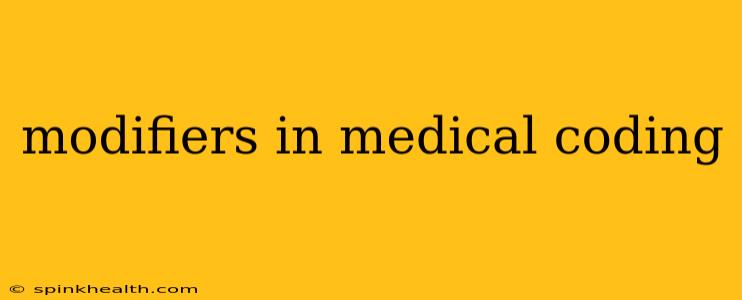Decoding the Mystery: Modifiers in Medical Coding
Medical coding, the language of healthcare billing, can seem like a labyrinth of codes and rules. But navigating this complexity is crucial for accurate reimbursement. One particularly tricky aspect is understanding modifiers – those seemingly insignificant additions to procedure codes that can significantly impact your claim's fate. Think of them as the fine print that dictates how a procedure was performed, where it took place, or who performed it. Let's unravel this mystery together.
Imagine you’re a seasoned physician, meticulously documenting a patient's visit. You've selected the appropriate procedure codes, but something feels off. The nuances of the procedure aren't fully captured. This is where modifiers step in, adding crucial context and preventing denials. They're the unsung heroes, quietly ensuring that your hard work translates into fair compensation.
What Exactly Are Modifiers in Medical Coding?
Modifiers are two-digit codes appended to CPT and HCPCS codes to provide additional information about the service or procedure performed. They clarify circumstances that wouldn't be evident from the procedure code alone. They help payers understand the specific details of the service, ensuring accurate payment and preventing claim denials. Without them, you risk underpayment or rejection of your claim.
Why Are Modifiers Important?
The importance of modifiers can't be overstated. They serve as a bridge between the technical description of a procedure and its real-world application. A single procedure code might represent a variety of scenarios. Modifiers disambiguate these scenarios, clarifying details such as:
- The location of the service: Was the procedure performed in an office setting, a hospital, or a patient's home?
- The nature of the service: Was it a bilateral procedure, a staged procedure, or a significant, separately identifiable E/M service?
- The type of anesthesia used: Was it a local anesthetic, regional anesthetic, or general anesthesia?
- The practitioner who performed the service: Did the primary physician perform the procedure, or was it a part of an assistant surgeon's duties?
Common Medical Coding Modifiers: A Quick Look
While there's a wide array of modifiers, certain ones are frequently used:
-
-25: Significant, separately identifiable E/M service by the same physician on the same day of the procedure or other service. This modifier is crucial when a separate evaluation and management service is performed on the same day as another procedure.
-
-50: Bilateral procedure. This modifier indicates that a procedure was performed on both sides of the body (e.g., bilateral knee arthroscopy).
-
-59: Distinct procedural service. This modifier shows that a service is distinct and separate from other services provided on the same date of service. This prevents the services from being bundled together.
-
-63: Procedure performed by another physician during the same session. This is frequently used when an assistant surgeon performs a specific part of the procedure.
-
-76: Repeat procedure by the same physician. This indicates that the same procedure was repeated by the same doctor, not just another healthcare professional.
-
-90: Procedure performed on an inpatient. It identifies inpatient procedures, helping to clarify the context of the procedure.
How to Choose the Right Modifier
Selecting the correct modifier requires meticulous attention to detail. Always refer to the official CPT and HCPCS coding manuals, as well as your payer's specific guidelines. Inconsistency in modifier usage can lead to claim denials and financial losses.
Frequently Asked Questions about Modifiers in Medical Coding
What happens if I use the wrong modifier? Using the wrong modifier can lead to claim denials, underpayments, or even audits. Accurate modifier selection is critical for proper reimbursement.
Where can I find a complete list of modifiers? The complete list of modifiers is found in the official CPT and HCPCS coding manuals. These manuals are regularly updated, so it's essential to use the most current versions.
Are there any resources to help me learn more about modifiers? Yes, numerous resources are available, including online coding courses, webinars, and professional coding associations.
Mastering medical coding modifiers is a journey, not a destination. Consistent effort in understanding their application and nuances will pay dividends in accurate billing and increased revenue. Remember, accuracy is paramount – a small detail can significantly impact your practice's financial health.

